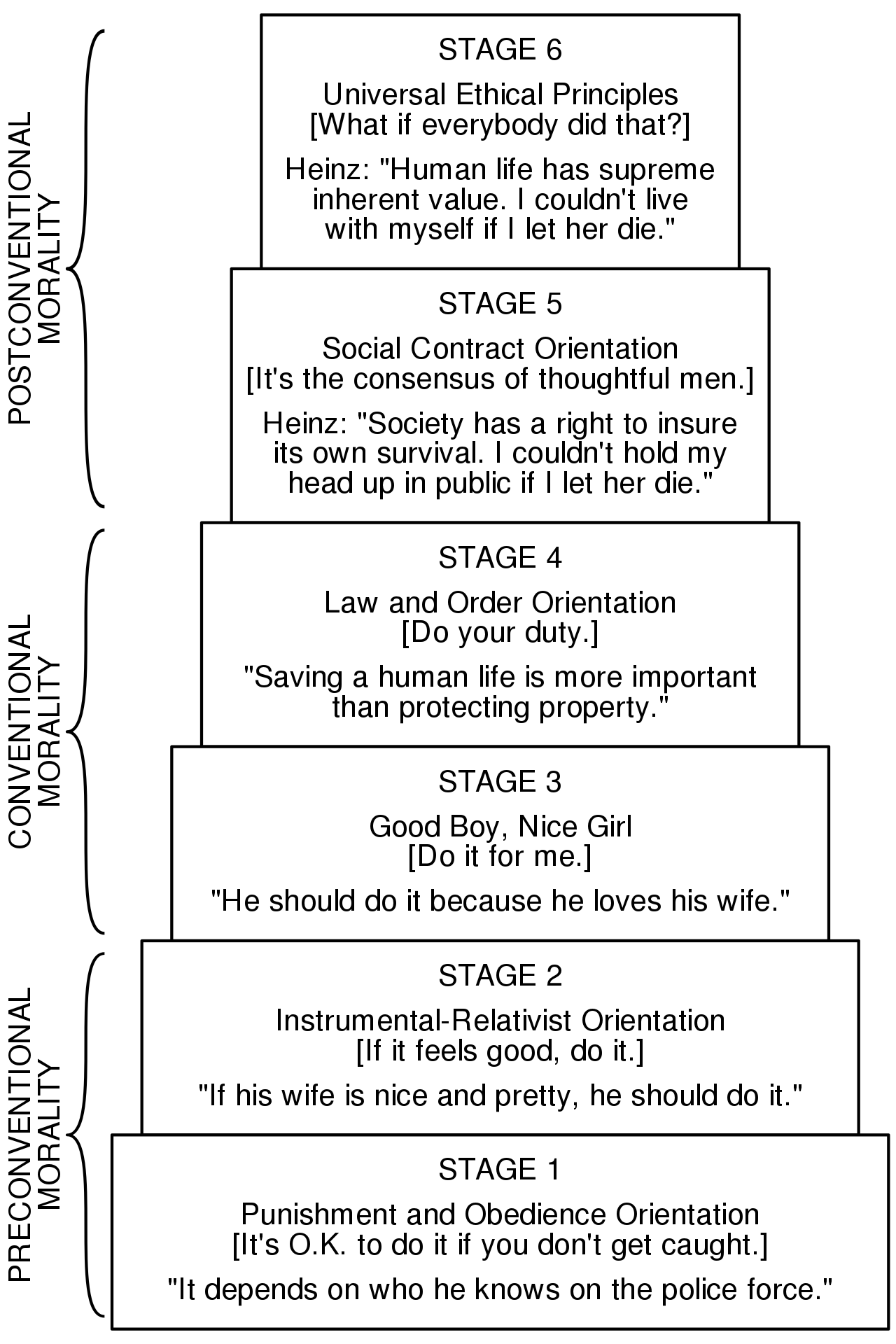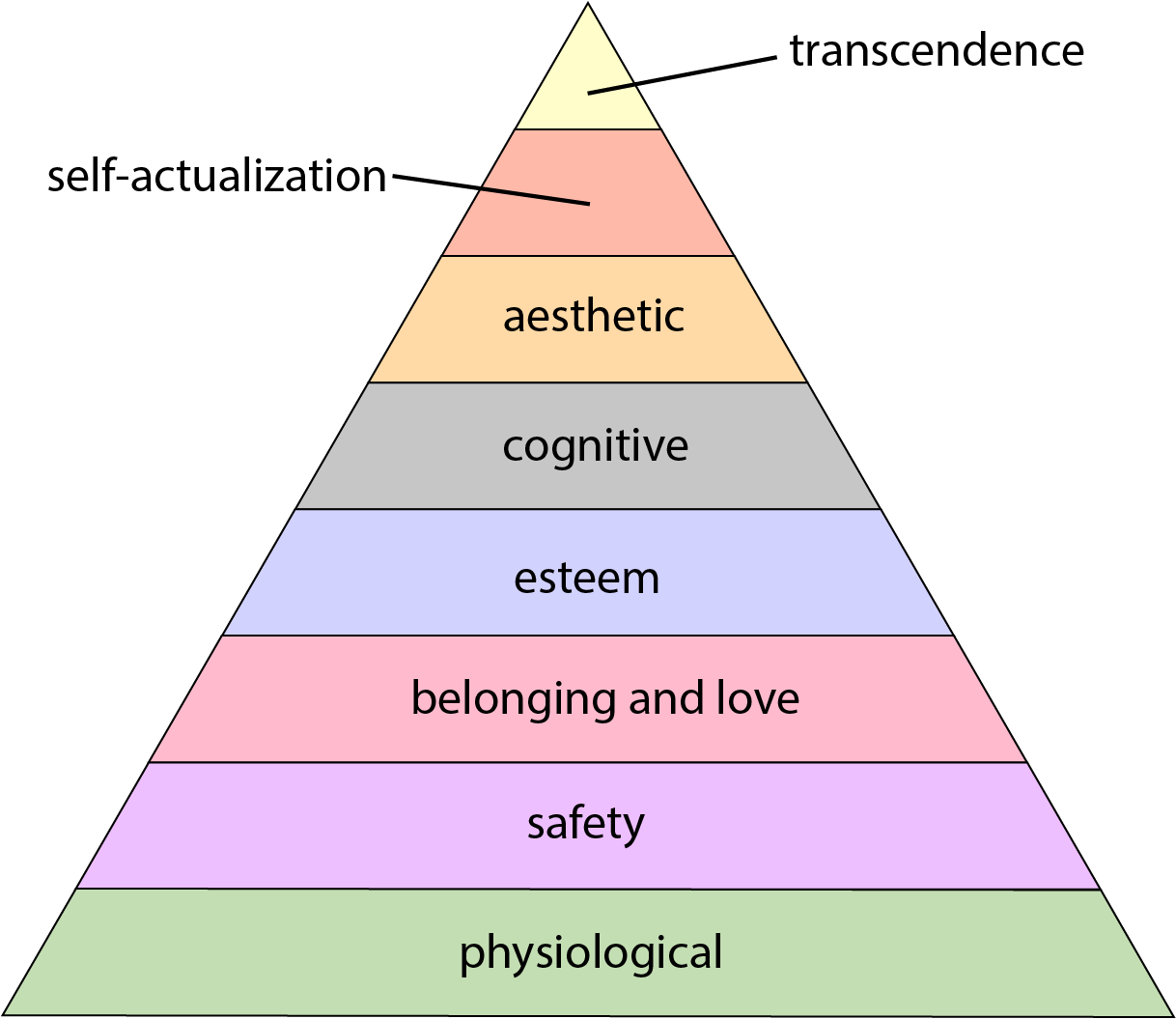Necessary Prerequisite: Difference between revisions
Fractalguy (talk | contribs) |
Fractalguy (talk | contribs) |
||
| Line 29: | Line 29: | ||
[https://en.wikipedia.org/wiki/Maslow%27s_hierarchy_of_needs Maslow's hierarchy of needs] marks a similar path for personal growth, but focused on the satisfaction of our physical and [[emotional]] needs as prerequisites for [[spiritual]] and [[moral]] [[fulfillment]]. Before you can find [[love]] you must first find shelter. Before you can achieve self-actualization, you must have [[love]]. Each stage is a step towards [[enlightenment]] that rests on the foundation of the previous stage. | [https://en.wikipedia.org/wiki/Maslow%27s_hierarchy_of_needs Maslow's hierarchy of needs] marks a similar path for personal growth, but focused on the satisfaction of our physical and [[emotional]] needs as prerequisites for [[spiritual]] and [[moral]] [[fulfillment]]. Before you can find [[love]] you must first find shelter. Before you can achieve self-actualization, you must have [[love]]. Each stage is a step towards [[enlightenment]] that rests on the foundation of the previous stage. | ||
Critics have pointed out that the order of this progression is not | Critics have pointed out that the order of this progression is not consistently followed [https://www.psychologytoday.com/us/blog/philosophy-and-therapy/202401/the-philosophy-of-maslows-hierarchy], but the concept is still important to understand. Basic needs should come first. If you are trying to increase [[happiness]] in a [[society]], a focus on higher [[education]] and the [[arts]] will have less impact than solving [[food]] scarcity if people are starving. [[Mental health]] issues are much easier to solve when you don't live on the street or a single [[paycheck]] away from it. | ||
It's a good way to understand the steps needed to get to [[enlightenment|self-actualization]]. Sure, the order of execution is not absolute, but the relative priorities are. It also demonstrates that you have to meet people where they are, fulfill the needs that are most pressing, and build on that infrastructure to achieve higher-level goals. | It's a good way to understand the steps needed to get to [[enlightenment|self-actualization]]. Sure, the order of execution is not absolute, but the relative priorities are. It also demonstrates that you have to meet people where they are, fulfill the needs that are most pressing, and build on that infrastructure to achieve higher-level goals. | ||
Revision as of 07:15, 5 January 2024
In Education
In education, you must learn the fundamental concepts for a subject before you can learn the advanced theory. The fundamentals are a Necessary Prerequisite for understanding the higher-level classes.
In Societies
In order for societies to evolve, there are necessary prerequisites for each step. If you have ever played the game Civilization then this point is obvious. You must invent the wheel and tame horses before you can invent the chariots that will let you dominate the ancient era. Writing must be invented before mathematics, which is required for trade and navigation.
Civ 6 Tech Tree | Civ 6 Civics Tree
In Moral Development

The developmental systems proposed by Kohlberg and Maslow exemplify how the concept of educational progression and prerequisite knowledge applies to areas of personal development. If you want to obtain enlightenment then there are necessary steps you must follow. metaculture seeks to define those steps, with science.
Kohlberg's Stages of Moral Development
Kohlberg's stages of moral development is an important concept to learn in order to understand how different people perceive ethical decision making. It comes up in many places on the metaculture wiki. It demonstrates how the building blocks of ethical knowledge and experience lead to a progressive expansion in our definition of ethics.
Maslow's Hierarchy of Needs

Maslow's hierarchy of needs marks a similar path for personal growth, but focused on the satisfaction of our physical and emotional needs as prerequisites for spiritual and moral fulfillment. Before you can find love you must first find shelter. Before you can achieve self-actualization, you must have love. Each stage is a step towards enlightenment that rests on the foundation of the previous stage.
Critics have pointed out that the order of this progression is not consistently followed [1], but the concept is still important to understand. Basic needs should come first. If you are trying to increase happiness in a society, a focus on higher education and the arts will have less impact than solving food scarcity if people are starving. Mental health issues are much easier to solve when you don't live on the street or a single paycheck away from it.
It's a good way to understand the steps needed to get to self-actualization. Sure, the order of execution is not absolute, but the relative priorities are. It also demonstrates that you have to meet people where they are, fulfill the needs that are most pressing, and build on that infrastructure to achieve higher-level goals.
Prerequisite for Peace
metaculture is a necessary prerequisite for a united human future. It is the framework that enables cross-cultural understanding of our common goals. Only when all people are able to see all others as members of their in-group can we be truly unified. This is accomplished by creating a common scientific framework for understanding religious allegory in all forms, allowing members of any culture to see other cultures as analogous equals rather than heretics and heathens.
The Dunning-Kruger Antiproliferation Movement
When it comes to understanding universal subjects like politics and religion, people with vastly different levels of subject matter expertise are expected to converse as peers. In order to understand ideas like universalism you must first have an understanding of the basic tenets of the major world religions and their commonalities. These are things that can be taught, but differences of opinion on these matters are not called out as the disparities in education that they truly are.
There are entirely too many people on social media giving opinions about things when they obviously haven't taken the prerequisite courses. They insert themselves into 300 level conversations about topics when they haven't passed the 101 course. Their ignorant opinions are often amplified by others with the same lack of expertise, on the basis that their arguments appeal to common sense or the values of their in-group. It has led to the mass-proliferation of misinformation via the Dunning-Kruger effect. Newsfeed promotion algorithms must be adjusted to prioritize experts, and trust in institutions must be restored so that expertise is not ignored or contradicted.
Our culture needs to develop a new taboo regarding the voicing of opinions on subjects which you have neither experience nor expertise. If you are just shooting your mouth off because you think you have to have an opinion about everything, or parroting something you heard but have no understanding of, then you need to sit down, shut up, and listen to the experts.
If you do participate in the conversation, remember to act like a student and not a teacher if you're not qualified to teach on the subject. By having well-understood and trusted standards for education and credentialing within all areas of specialization, and cultural norms that reinforce them, we can hopefully get to a place where our minds are consistently nourished by the finest information from the most knowledgeable subject matter experts.